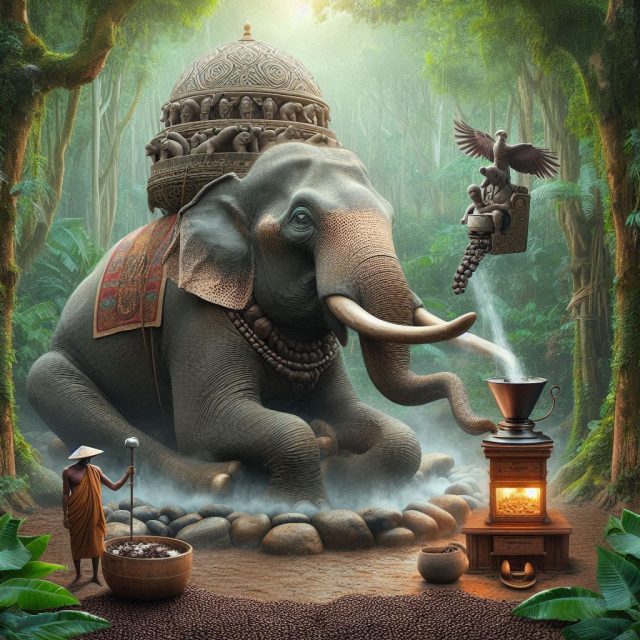Coffee is a cherished beverage enjoyed by millions around the globe. Its rich flavors and aromas come from a complex interplay of factors including the variety of the coffee plant, the soil, the climate, and the methods of processing and brewing. Among these factors, the role of animals in coffee production offers a fascinating glimpse into how wildlife can contribute to unique flavors. One of the most intriguing methods involves elephants. This article explores how elephants contribute to unique coffee flavors, focusing on the process, benefits, and broader implications of elephant dung coffee.
The Concept of Elephant Dung Coffee
Elephant dung coffee, also known as Black Ivory coffee, is produced using a method that closely resembles the more famous kopi luwak, or civet coffee. Both processes involve animals consuming coffee cherries and then excreting the beans, which are later collected, cleaned, and processed. The idea behind this technique is that the digestive enzymes in the animal’s stomach alter the chemical composition of the coffee beans, leading to a distinct flavor profile.
Sip the Wild Side: Taste the Elephant’s Secret
The Production Process
1. Coffee Cherry Consumption
The process begins with the elephants eating coffee cherries. These cherries are the fruit that contains the coffee beans. Elephants, being large herbivores, consume a variety of fruits and plants, including coffee cherries when they are available. The cherries are a natural part of their diet, and the elephants’ large size means they can consume large quantities.
2. Digestion and Fermentation
Once ingested, the coffee cherries pass through the elephant’s digestive system. In the stomach, the cherries undergo a natural fermentation process. The digestive enzymes and acids in the elephant’s stomach break down some of the proteins and other compounds in the coffee beans. This fermentation process is crucial as it alters the chemical makeup of the beans, contributing to their unique flavor.
3. Collection and Processing
After the cherries have been digested, the beans are excreted in the elephant’s dung. The beans are then carefully collected from the dung, thoroughly washed, and dried. Following this, the beans are roasted to produce the final coffee. The roasting process is similar to that used for conventional coffee, but the beans have already undergone a unique fermentation process in the elephant’s digestive tract.
Unique Flavor Profile
The key attraction of elephant dung coffee lies in its unique flavor profile. The fermentation process in the elephant’s stomach affects the coffee beans in several ways:
1. Reduced Bitterness
One of the primary changes in the beans is a reduction in bitterness. The fermentation process breaks down certain bitter compounds, leading to a smoother, less acidic taste. This results in a cup of coffee that is often described as having a more balanced flavor, with less of the sharp bitterness associated with some coffees.
2. Enhanced Aromas
The digestive enzymes in the elephant’s stomach also impact the aroma of the coffee. The beans develop a more complex aromatic profile, with notes that might include hints of chocolate, fruit, or floral undertones. This complexity is a result of the breakdown of various chemical compounds during fermentation.
3. Mellowed Acidity
The acidity of coffee is another factor that can be altered by the fermentation process. In the case of elephant dung coffee, the acidity tends to be mellowed, making the coffee smoother and less tangy. This is particularly appealing to those who prefer a milder cup of coffee.
4. Unique Tasting Notes
Each batch of elephant dung coffee can have its own distinctive set of tasting notes. This variability is influenced by the diet of the elephants, the specific beans consumed, and the fermentation process. As a result, every cup of elephant dung coffee can offer a slightly different flavor experience.
Benefits of Elephant Dung Coffee
1. Novelty and Exclusivity
Elephant dung coffee is a rare and exclusive product. The unique production method and the limited quantity available contribute to its high price and desirability among coffee enthusiasts. The novelty of drinking coffee that has been processed through an elephant’s digestive system adds to its appeal.
2. Environmental Conservation
The production of elephant dung coffee can also have positive environmental impacts. By creating a market for coffee produced using elephants, local communities may be incentivized to protect these animals and their habitats. This can lead to increased conservation efforts and a greater appreciation for wildlife.
3. Support for Local Communities
In regions where elephant dung coffee is produced, it can provide economic opportunities for local communities. The cultivation and processing of this specialty coffee can create jobs and support local economies, contributing to sustainable development in the area.
Challenges and Ethical Considerations
1. Animal Welfare
One of the primary concerns with elephant dung coffee production is the welfare of the elephants. It is crucial that the elephants are treated well and are not subjected to any form of mistreatment. Ethical production practices should ensure that the animals are healthy, well-cared for, and live in appropriate conditions.
2. Sustainability
The production of elephant dung coffee should also consider environmental sustainability. Ensuring that the coffee production process does not negatively impact local ecosystems or contribute to deforestation is essential. Sustainable practices should be adopted to balance the benefits of this unique coffee with the preservation of natural habitats.
3. Authenticity and Quality Control
Maintaining the authenticity and quality of elephant dung coffee is another challenge. The beans must be carefully collected, cleaned, and processed to ensure that the final product meets high standards. Proper quality control measures should be in place to ensure that the coffee is safe for consumption and that its unique flavor profile is preserved.
The Future of Elephant Dung Coffee
1. Growing Popularity
As interest in specialty coffees continues to grow, elephant dung coffee may become more widely recognized. Its unique production method and distinct flavor profile make it an attractive option for coffee aficionados seeking new and unusual experiences. As the market for specialty coffees expands, elephant dung coffee may find a larger audience.
2. Expanding Production
The production of elephant dung coffee is still relatively limited, but there is potential for growth. Increased demand could lead to more producers entering the market and the development of new methods to ensure the ethical and sustainable production of this specialty coffee.
3. Continued Research
Ongoing research into the effects of digestion and fermentation on coffee beans could further enhance our understanding of how animal involvement impacts flavor. This research could lead to innovations in coffee production and contribute to the development of new and exciting coffee varieties.
Elephant Dung Coffee: Where Nature Meets Luxury
Conclusion
Elephant dung coffee represents a fascinating intersection of wildlife and coffee production. The involvement of elephants in the production process contributes to a unique flavor profile that is distinct from more conventional coffees. The fermentation of coffee beans in the elephant’s digestive system results in reduced bitterness, enhanced aromas, and mellowed acidity, creating a cup of coffee with complex and appealing characteristics.
While the production of elephant dung coffee offers several benefits, including novelty, environmental conservation, and support for local communities, it also presents challenges related to animal welfare and sustainability. As interest in this specialty coffee grows, it is essential to address these challenges and ensure that production practices are ethical and sustainable.
The future of elephant dung coffee is bright, with the potential for increased popularity and expanded production. As we continue to explore the ways in which animals can contribute to unique coffee flavors, the story of elephant dung coffee serves as a testament to the intriguing and diverse world of coffee production.






